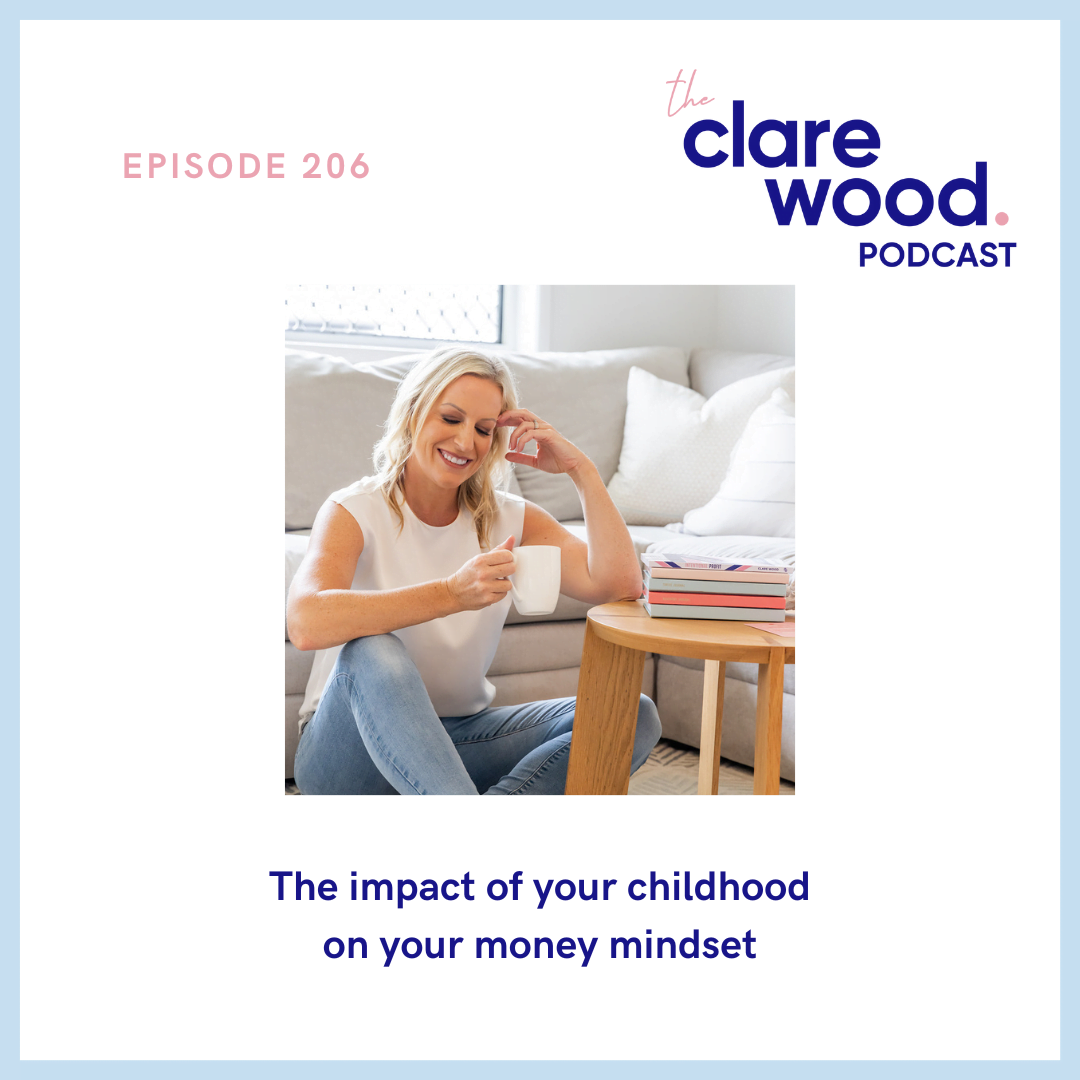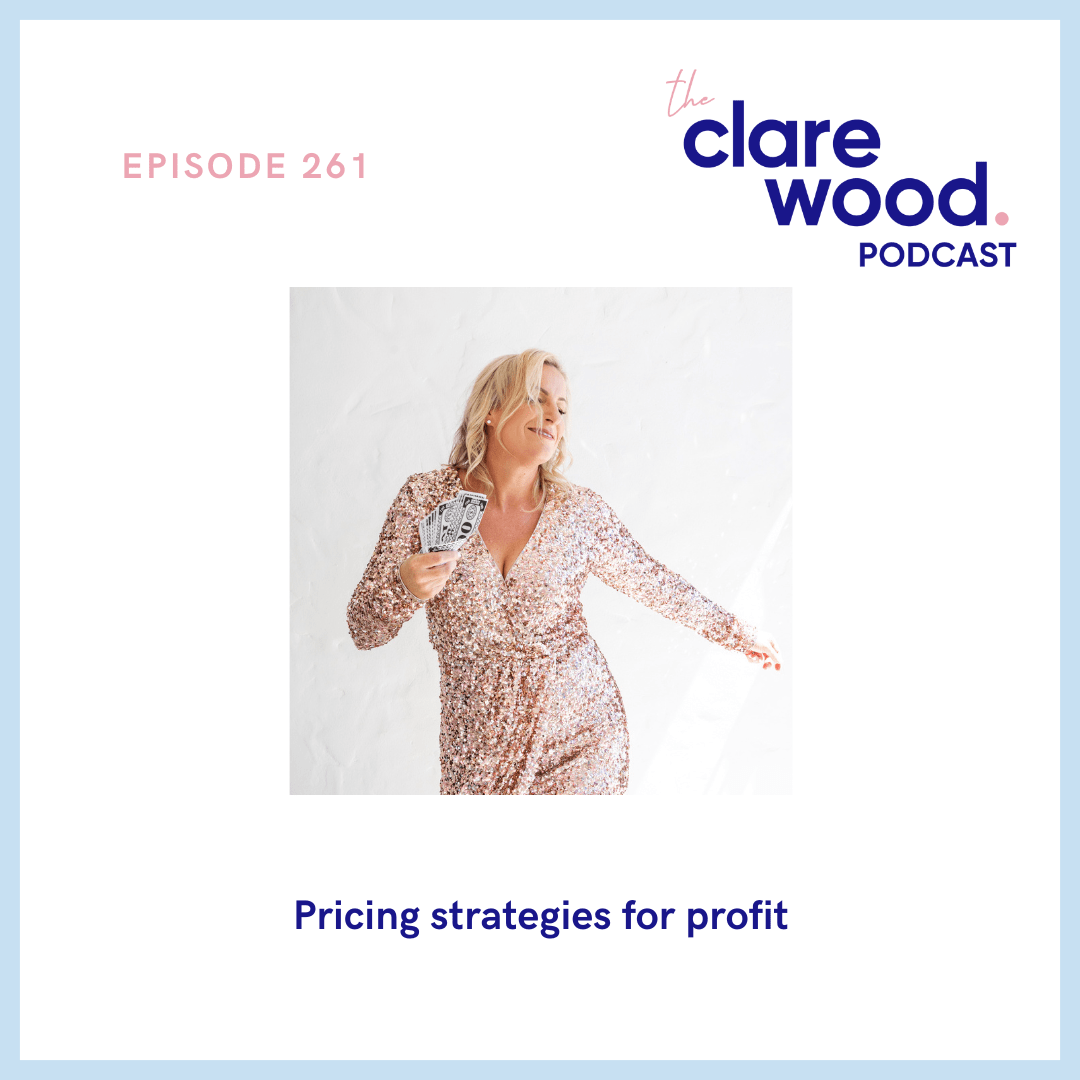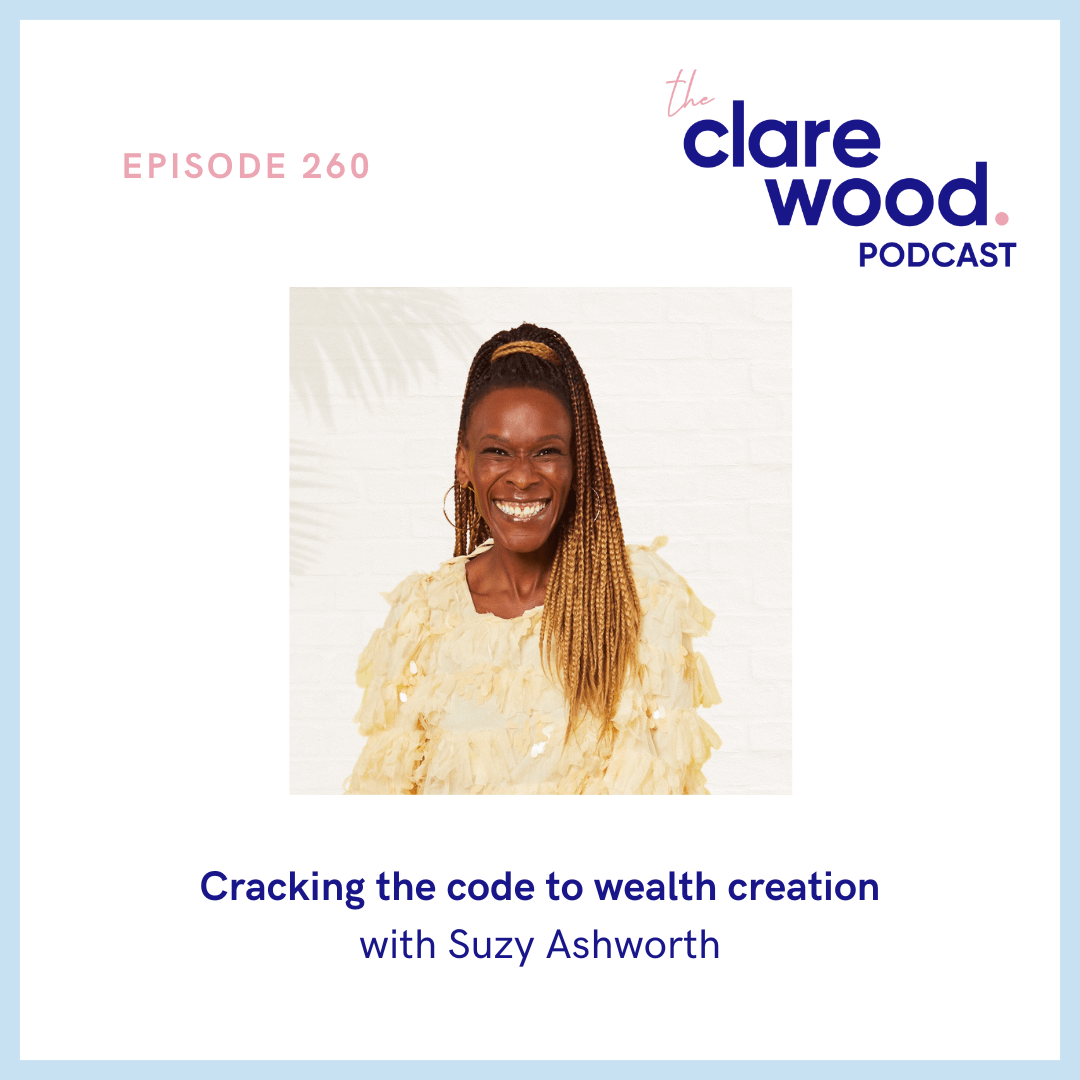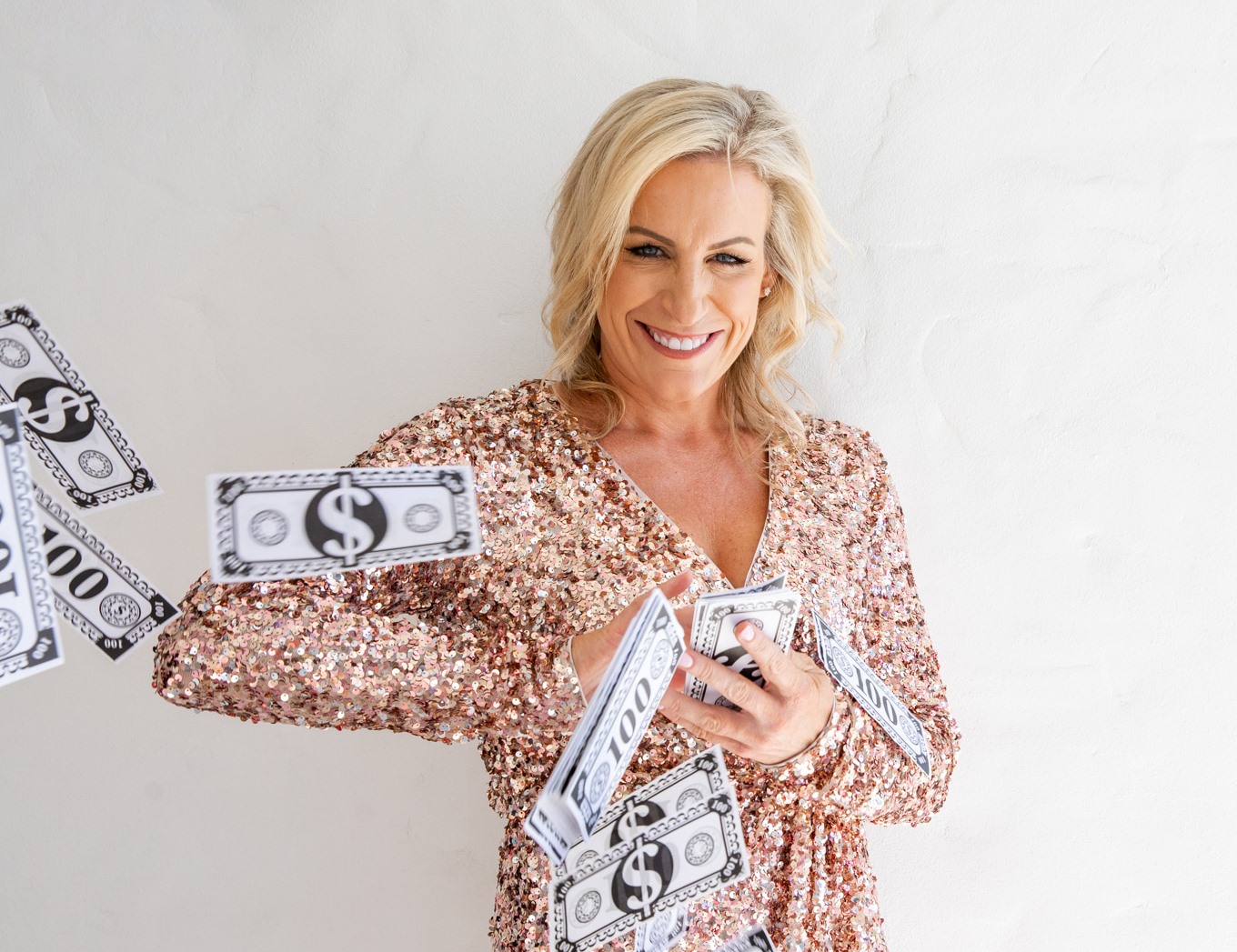Growing up, did you ever hear “We can’t afford that” or “Money doesn’t grow on trees” or any other limiting stories around money?
In today’s episode I’ll be sharing why your childhood stories around money affect your ability to earn, invest and hold money and how you can re-write these stories.
In this Episode:
00.00: To be advised…
Links:
Transcript
Our childhood, the source of so many of our belief frameworks.
If you have ever heard the saying when you were growing up, we can’t afford that money doesn’t grow on trees or any other limiting stories around money. You will love this episode. I’ll be sharing why your childhood stories around money affect your ability to earn, invest, and hold money to this very day, and how you can rewrite your money stories.
Hello and welcome to the Clare Wood Podcast. This is your weekly dose of all things money to help you intentionally create a profitable business and a life you love. I have the difficult conversations about money so you can make more money within each week. I share how you can use mindset and the practical foundations of finance to elevate your earnings without sacrificing the things that are important to you because you can and should be making more money.
First of all, what is money mindset? Mindset? Our money mindset is our beliefs about money. Why is this important? Because what we believe about money has a huge impact on our ability to make, invest and hold money. So having a healthy money mindset is very important. If you want to build a successful business and create wealth. It’s important to recognize how our childhood experiences shape our money mindset because it can help us understand why we think and behave the way we do around money. Once we become aware of these patterns, we can start to challenge and change them.
So let’s work out what impact your childhood had on your money mindset.
Think back to your childhood. How was money spoken about in your household? Did your parents talk openly about money or was it a taboo subject? How did your parents or guardians talk about luxury and luxurious experiences for maybe you heard we’re going on a holiday, I have to work really hard so we have enough money for this experience. How did your parents, guardians, custodians talk about wealthy people?
In my household, my dad used to talk about the rich in a really negative way, and to this day, he still talks about the elite and the rich. And to this day, I can see how that had a subconscious effect of me thinking negative things about wealthy people. So if I had a belief that wealthy people were bad, obviously there’s gonna be something in my subconscious programming that’s gonna say, well, you don’t wanna be a bad person, so therefore don’t become rich, don’t become wealthy. These early experiences that we had in our childhood can have a lasting impact on how we think and feel about money as adults. So I grew up in a household where money was always tight, and maybe this is relevant to you. Maybe you developed a scarcity mindset around money. This was definitely what it was like in my household growing up. I’m one of five children, and both my parents worked in low income jobs for most of my childhood. And so money was always a source of stress, of lack. And for me, in my adulthood, this has translated into a lot of fear around money. Particularly in my early adulthood. I was very conscious about money. I wouldn’t spend money on anything. What I would do. I was so scared that money would disappear, that I would hold onto it really, really tightly. And then as I got older and started earning more, I completely swung the other way. I was earning six figures a year by the age of 25 in my accounting background. And for the first time in my life, I actually had money. And oh my gosh, I started having fun with it . I was traveling and going out. I was really enjoying for the first time in my life actually having abundance, feeling like there was plenty of money and I didn’t have to worry about it. So you can see how both of these poly experiences both essentially stemmed from the same experience in my childhood, which was having a a household where money was tight.
Now, now you might think, well, what about people who grew up in a household with a lot of money?
I’ve had clients of mine who grew up in in wealthy households and friends of mine as well, and they have their own stories about money. One of them grew up in a, parents are both entrepreneurs and they had a beautiful family life. They certainly had a lot of luxury and abundant experiences growing up, but her parents were always working. And so what she recognized was that her subconscious belief was, yes, I can have a beautiful, amazing abundant life, but I have to work really hard to make that happen. I don’t get to have downtime. I don’t get to have holidays, I don’t get to have weekends. I have to work really hard if I wanna create the kind of lifestyle that I had growing up. I had another client of mine who again, grew up in a rich household and she felt so much guilt around her financial success.
Every time she’d step into a new level of growth, she felt guilty because she’s like, I already come from money and I’ve already had a really nice life. And it seems really unfair because other people don’t have as much as what I do.
So you can see that our stories can affect us in many different ways. The default pattern is that we are unaware of how our childhood affects us. And this can be in any era of our life. We often repeat what we saw in our childhood, or alternatively, we swing and do the complete opposite. But usually this is done without intentionally thinking about it. Some examples of ways that this plays out is that often we see generation after generation who live unemployment benefits. And the reason is is because that’s what you’ve seen your life and that’s really normalized to you.
Similarly, we can see things like drug addiction and alcoholism that come down from generation to generation because it seemed really normal in our childhood, and that’s sort of what we just grew up with. And it’s the same with our money. But here’s the good news. Our money stories aren’t fixed. They aren’t set in stone. Now, this means that our perception, our beliefs, our stories around money can and will change over time, and they can change subconsciously.
For example, and I’ve spoken about this before on the podcast, if your circle that you hang out with are suddenly people who are earning more money, it will start to become normalized to you that you’re like, whoa, I can make more money. All people around me are, and I’ve spoken a lot about the power of the people that you hang out with. But what happens is that something happens and subconsciously it changes our story or our belief around money. Maybe something negative happens and we think, oh my gosh, there’s a recession we have to hold onto all of our money, and it really changes the way that we think about money.
So our stories can be changed subconsciously, or we can choose to change them consciously. We can say, that doesn’t serve me anymore, and I wanna write a new reality for myself.
So how exactly do we start to change our money mindset? Well, the fact that you are listening to this episode means that you are already undertaking the first step in rewriting your financial future, which is identifying what your limiting beliefs around money are.
Now I wanna take this thinking that step further and really put it into a practical step that will help you to unlock what some of these stories are. So a great exercise that you can do after you switch off this episode is to write out all of your stories about money that came from your childhood. Grab pen and paper and spew it all out on the page.
Some of the stories that might come out, for example, again this is one from my childhood. Only people with university degrees become millionaires. It will never happen for me unless I go on and get multiple university degrees. So jot down everything that comes up for you from your childhood, and this is the very first step. What are your limiting beliefs around money? And then from there, you can work on reprogramming your beliefs and starting to create new and more positive thoughts around money. And this is essentially what money mindset is.
Now, unfortunately, this process isn’t just a simple exercise that I can share with you here on the podcast. In fact, it’s quite a complex and multi-layered process to undo years of your subconscious learning and beliefs.
I am so excited to be teaching my new mindset course accelerator, which is my second program inside the Profit Academy. Inside this course, I will be sharing all of my mindset, habits, practices, and strategies that I have used to manifest and create so many of the amazing things that I currently have in my life from my dream business, my waterfront home on our perfect street, my ideal life partner, my boat, my beautiful car going on multiple overseas luxury holidays, having a savings account and many other things.
I’m not sharing these things to brag, but rather to show you what’s possible for you. If I can do it, anyone can do it, and that’s why I’m so excited for my new course so I can show you how you too can create the awesome things you want to have in your life, whether it’s making more money, finding your dream partner, or simply being able to have less days of work.
In next week’s episode of the podcast, I’ll be announcing my free three day money mindset challenge that’s coming up very soon. So please make sure you tune in for next week’s episode and come and join me on this free three-day challenge so I can help you to start to reprogram some of your money mindset stories. In conclusion, our childhood experiences can have a significant impact on our money mindset by becoming aware of our patterns and beliefs and challenging them when necessary, we can create a healthier and more positive relationship with money.
If this episode resonated with you, I’d be so grateful if you can share it with your audience on social media. And please make sure you tag me so I can say thank you.
And just a reminder, if you haven’t already, be sure to grab a copy of my book, intentional Profit, and to come along to one of my book tour events here in Australia and say hi. The next one is in Sydney on the 27th of April. You can grab tickets in the show notes to today’s episode. I really hope to see you there. And remember, our childhood money stories are our past, but they don’t have to be our future.
I hope you are feeling inspired and excited about what is possible for you when it comes to money. It takes a lot of time and energy to create a podcast. So I’d be very grateful if you could take the time to hit subscribe, write me a review and share any of your favorite episodes with your audience on social media. The more people that we can reach, the more people we can empower to earn more in their business because you can and should be earning more money.







